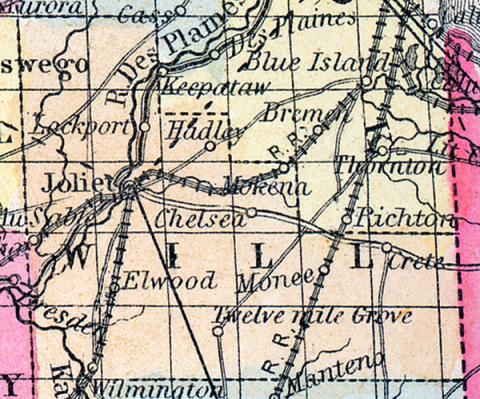WILL, county, Ill. Situated toward the N. E. part of the stale, and contains 504 square miles. Drained by Kankakee r. and its branches. Desplaines r. bounds it on the N. W. Capital, Juliet. There were in 1840, neat cattle 9,278, sheep 2,584, swine 15,690; wheat 110,464 bush. produced, Ind. corn 173,383, buckwheat 1,561, barley 5,729, oats 271,587, potatoes 112,482, sugar 8,100 pounds; 41 stores, cap. $142,693; 1 tannery, 1 distillery, 2 flouring m., 5 grist m., 14 saw m., 1 printing office, 1 weekly newspaper. Cap. in manufac. $96,234. 3 acad. 68 students, 35 sch. 1,082 scholars. Pop. 10,167. (Haskell's Complete Descriptive and Statistical Gazetteer of the the United States...,1843)
WILL COUNTY, situated on the east boundary of Illinois, and traversed by Des Plaines river. Area, 504 square miles. Face of the country even; soil, generally fertile. Seat of justice, Joliet. Pop. in 1840, 10,167; in 1850, 16,703. (Fanning's, 1853)
WILL COUNTY A county in the east-north-east part of the state, bordering on Indiana, Has an area of 1,236 square miles. It is intersected by the Kankakee and Des Plaines rivers, branches of the Illinois. The surface is generally level and destitute of timber, excepting small groves. The soil is very fertile and much of it is under cultivation. The soil of the prairie is a deep sandy loam, adapted to Indian corn and grass. It contains 15 or 18 churches, three newspaper offices, about 8,500 pupils attending public schools, and 260 attending other schools. Quarries of building stone are worked near the county scat. The Des Plaines river furnishes water power. The county is intersected by the Illinois and Michigan canal, by the Chicago Branch of the Central railroad, the Chicago and Mississippi and by the Chicago and Rock Island railroad. Named in honor of Conrad Will, for many years a member of the Illinois legislature. Capital, Joliet. Population, about 19,000. County Judge, Oscar L. Hawley. Sheriff, Geo. R. Dyer. (Hawes' Illinois State Gazetteer...,1859)

